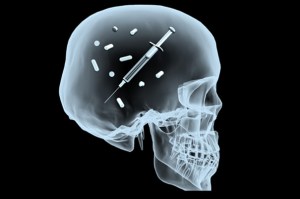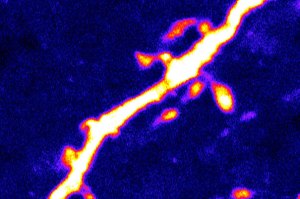Tag: Neuron
-
Science & Tech
Human brain seems impossible to map. What if we started with mice?
Harvard-led project seeks to create the first comprehensive diagram of every neural connection.
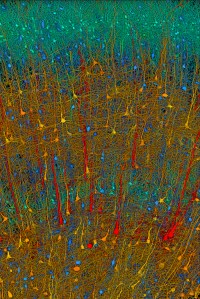
-
Science & Tech
Linking sight and movement
Harvard neuroscientists look at how movement influences vision and perception.
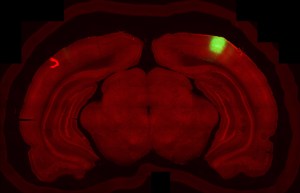
-
Science & Tech
How a zebrafish model may hold a key to biology
Martin Haesemeyer set out to build an artificial neural network that worked differently than fish’s brains, but what he got was a system that almost perfectly mimicked the zebrafish — and that could be a powerful tool for understanding biology.
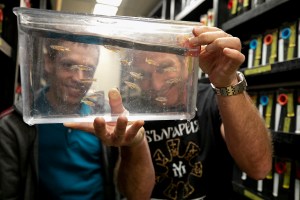
-
Science & Tech
Sensors go undercover to outsmart the brain
Harvard scientists have created brain implants so similar to neurons that they actually encourage tissue regeneration in animal models. They may one day be used to help treat neurological diseases, brain damage, and even mental illness.
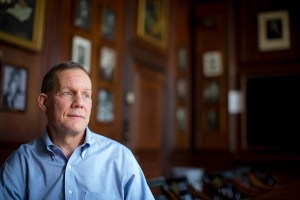
-
Science & Tech
More than a courier
Now research suggests that a nerve cells’ axons may be making decisions on their own, challenging the dogma that the nucleus and cell body are the control centers of the neuron.
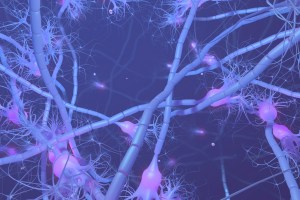
-
Science & Tech
How to feel the heat
A team of researchers was able to show how sensory neurons in the face detect temperature, and how this information is later passed on to the hindbrain of zebrafish, where it is processed to produce behavior.
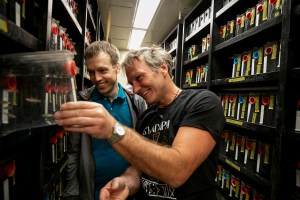
-
Health
Closer view of the brain
A team of researchers has succeeded in imaging — at the nano scale — every item in a small portion of mouse brain. What they found, Lichtman said, could open the door to, among other things, understanding how learning alters the brain.
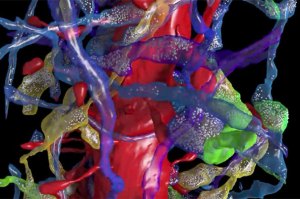
-
Health
Creatures of habit
The motor cortex is critical to learn new skills, but may not be needed to perform them, a new Harvard study says.
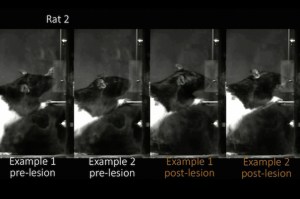
-
Health
A new understanding of Alzheimer’s
Using the principle of natural selection, researchers have outlined a new model of the disease suggesting that mitochondria — power plants for cells — might be at its center.
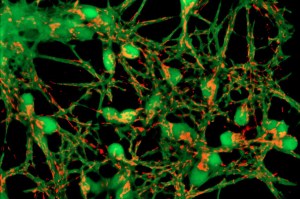
-
Health
Inconsistent? Good
Though variability is often portrayed as a flaw to be overcome, Harvard researchers now say that, in motor function, it is a key feature of the nervous system that helps promote better or more successful ways to perform a particular action.

-
Health
Something doesn’t smell right
Harvard scientists say they’re closer to unraveling one of the most basic questions in neuroscience — how the brain encodes likes and dislikes — with the discovery of the first receptors in any species evolved to detect cadaverine and putrescine, two of the chemical byproducts responsible for the distinctive — and to most creatures repulsive…
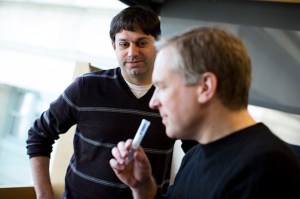
-
Health
Deconstructing motor skills
Harvard researchers have found that the brain uses two largely independent neural circuits to learn spatial and temporal aspects of complex motor skills.
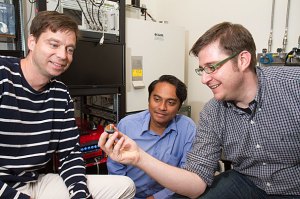
-
Health
‘Brainbow,’ version 2.0
Led by Joshua Sanes and Jeff Lichtman, a group of Harvard researchers has made a host of technical improvements in the “Brainbow” imaging technique.
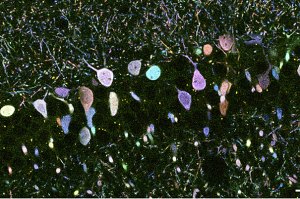
-
Campus & Community
A look inside the lab
The Faculty of Arts and Sciences’ Division of Science recently relaunched its “Science Research Lecture Series,” aimed at introducing the broader local community to research conducted by Harvard faculty members. The talks will be held once a month in the Science Center, and will be open to the public.
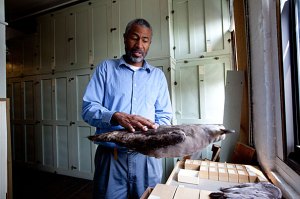
-
Health
Environment counts, Alzheimer’s research suggests
A new study led by Harvard Medical School Professor Dennis Selkoe provides specific, pre-clinical scientific evidence supporting the concept that prolonged and intensive stimulation by an enriched environment may have beneficial effects in delaying one of the key negative factors in Alzheimer’s disease.
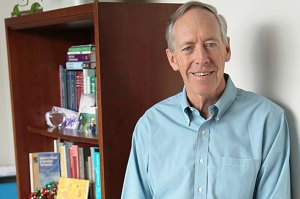
-
Health
Linking insulin to learning
Work led by Yun Zhang, associate professor of organismic and evolutionary biology, shows how the pathway of insulin and insulinlike peptides plays a critical role in helping to regulate learning and memory.

-
Health
Sniff mechanics
As described in a Dec. 19 paper in Neuron by Venkatesh Murthy, a professor of molecular and cellular biology, researchers have, for the first time, shed light on how the neural feedback mechanism of the olfactory system works by identifying where the signals go, and which type of neurons receive them.
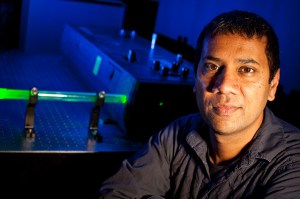
-
Health
Sophisticated worms
In a new study of worm locomotion, researchers show that a single type of motor neuron drives an entire sensorimotor loop.

-
Health
A fresh look at mental illness
In a paper published in Neuron, Joshua Buckholtz and co-author Andreas Meyer-Lindenberg identify a biological reason for why many mental disorders share similar symptoms, a situation that makes diagnosis challenging.

-
Health
The growing brain
As reported on June 7 in the journal Neuron, a team of researchers led by Professor Jeff Lichtman has found that just days before birth mice undergo an explosion of neuromuscular branching. At birth, the research showed, some muscle fibers are contacted by as many as 10 nerve cells. Within days, however, all but one…
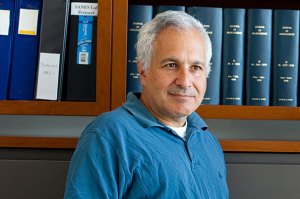
-
Health
Tracing the brain’s connections
A team of researchers is using a genetically modified version of the rabies virus to create the first comprehensive list of inputs that connect directly to dopamine neurons in two regions of the brain.
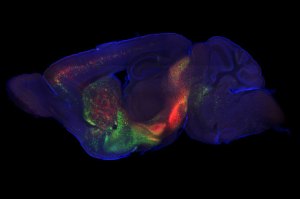
-
Health
Unraveling the secrets of the epilepsy diet
Researchers at Harvard Medical School and Harvard-affiliated Dana-Farber Cancer Institute have identified a protein that plays a key role in the long-mysterious effectiveness of an extremely low-calorie, high-fat, low-carbohydrate diet in suppressing epileptic seizures.

-
Science & Tech
Brain navigation
Hanspeter Pfister, an expert in high-performance computing and visualization, is part of an interdisciplinary team collaborating on the Connectome Project at the Center for Brain Science. The project aims to create a wiring diagram of all the neurons in the brain.

-
Health
‘Circuits of sense and sensibility’
A Harvard biologist succeeds in mapping a neural network for learned olfactory behavior, using a roundworm model to trace the dislike of a particular smell to the reaction that avoids it.

-
Health
Doing the neuron tango
A group of Harvard Stem Cell Institute researchers in the Department of Stem Cell and Regenerative Biology has discovered that excitatory neurons control the positioning of inhibitory neurons in the brain in a process critically important for generating balanced circuitry and proper cortical response.
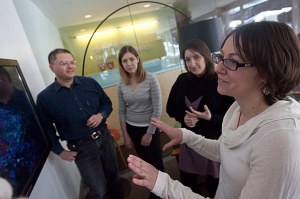
-
Health
The nose knows
Harvard researchers have shed light on how the sense of smell works to induce behavior, linking patterns of electrical spikes in the brain to behavior in laboratory animals.
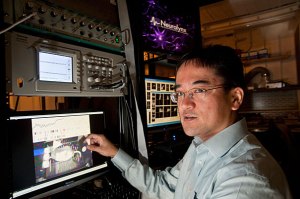
-
Health
What’s right for me?
In a new study, Harvard scientists find that humans can make difficult moral decisions using the same brain circuits as those used on more mundane choices such as money or food.




